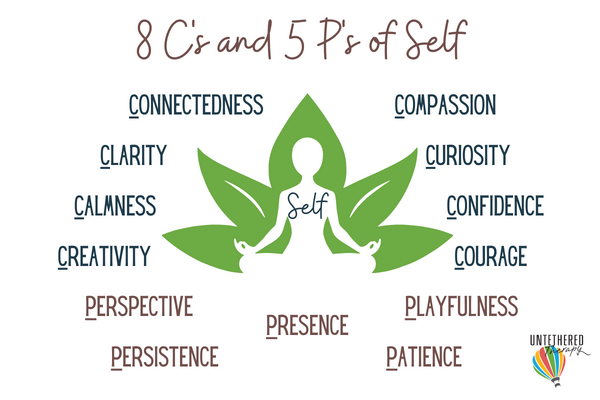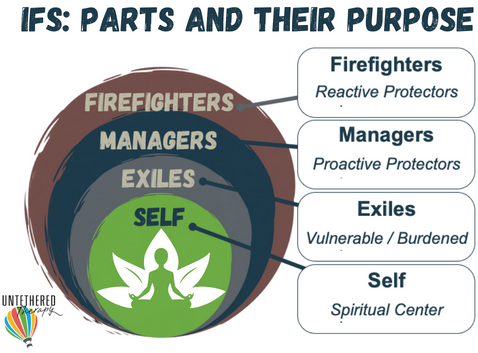Parts and their Roles
There are 3 primary roles that our different parts can fulfill in the internal family system:
- Self – our core or true self, essence, spirit
- Protectors – parts who try to protect vulnerable or traumatized parts of us using proactive or reactive strategies
- Exiles – the burdened, traumatized, or vulnerable parts of us who frequently carry negative core beliefs and insecurities
When we lack insight into our different parts–who they are, what activates them, and how they interact with each other, we frequently feel a lot of internal tug-of-war and chaos. Getting to know our parts and helping them learn to get along and communicate, calms and integrates the system and paves the way for ultimate healing.
No Bad Parts!
One of the things I love most about the IFS model is embracing the truth that there are no bad parts, just parts that may get stuck in extreme roles. All of our parts have good intentions. Sometimes our parts have blinders on and cannot see the forest through the trees. Sometimes they struggle to see how their protective or self-preserving strategies can cause trouble for other parts of the system and the person as a whole.
Despite the fact that our parts may employ very different strategies, they ultimately have the same positive intention of helping us. This can be a difficult concept to embrace when our parts might have led us to addiction or to self-harm. However, when we can help all of our parts to see that they have the same goal – protection or preservation of the whole – we can help them to work better as a team, perhaps delegating new, healthier roles or coping mechanisms to those parts whose strategies have ultimately been harmful.
Burdens
The “jobs” or roles our parts take on are organized around the pain or “burden” our more vulnerable parts (Exiles) hold. These burdens can manifest as negative core beliefs about self (I’m not good enough, I’m worthless, I’m a failure), intense emotions (shame, fear, terror, rage), and body sensations (stomach pain, headache, heart palpitations). These burdens may be our own from past traumas or negative life experiences or can be absorbed from others, especially family members, cultural heritage, or society, taking the form of legacy burdens.
Self
When we are connected with our true self (“self-led”), we are able to see things and ourselves as we truly are. It is our internal healer, spiritual center, and source of peace and insight. It expands our mind and our perspective to help us get unstuck from the dilemmas we are facing. Self is naturally compassionate and curious about the pain (burdens) our parts and others carry. Since this is our true self, these qualities are innate in each and every one of us, but sometimes it may be difficult to access when other parts are activated and “in control.” Therefore, learning how to connect with and be led by our true self is the ultimate source of healing. We can know when we are in connection with our true self by learning to recognize its qualities.
The qualities of self are often named as the 8 C’s and 5 P’s of Self; Curiosity, Caring, Creativity, Courage, Calmness, Connectedness, Clarity, Compassion, Presence, Patience, Persistence, Perspective, and Playfulness.

The protectors have the positive intention of trying to protect our systems, and utilize proactive or reactive strategies to do so. There are 2 main types of protectors which are organized by their coping strategies: Managers and Firefighters.
Managers
Managers are our proactive parts that try to help by preventing us from feeling the pain of the Exiles by controlling, restricting, and seeking perfection through criticism. They are the ones who recognize there is a problem and try to fix it or prevent it. Managers are often the ones that call to schedule therapy and push to “fix” other parts of the system – even if those parts may not be on board with being “fixed” or don’t believe they have a problem. Managers can serve to start the process of healing, but if we move forward against the will of the other parts, there may be a backlash (dissociation, termination of therapy, or regression following the work).
Firefighters
Firefighters are the reactive parts that help us cope with negative emotions once they have been triggered. They are the parts that tend to have a bad reputation as they frequently cope through compulsive or addictive substances or behaviors. They can frequently feel attacked, shamed, and isolated by the system, especially the Managers. When dealing with our Firefighters, it is important to remember that there are NO BAD PARTS; they are only trying to help protect us or help us cope with pain.
These parts only come on the scene once the system has already caught on fire and will do whatever it takes to stamp out or deal with the negative emotion or threat they detect. Some of the most frequent strategies include addiction, busyness, and escapism. Their positive intention is to “save us” from the feeling, shame, or threat and stop us from feeling. Sometimes these parts can even take on the role of dissociation or suicidal ideation as a way to escape the pain or threat.
Exiles
Exiles are the vulnerable parts that carry the pain and feel intense emotions (such as shame) from past trauma or negative experiences. When they are activated, they tend to flood the person and make it difficult to connect to Self and think clearly. Exiles are often young, carrying difficult emotions and experiences from childhood. Healing our Exiles is ultimately the goal of IFS therapy–connecting with these vulnerable parts and allowing them to unburden themselves can only be done with permission and buy-in from all parts of the system.

As a Licensed Marriage and Family Therapist, the concept of IFS feels intuitive to me, as it explains so much of the ambivalence and internal confusion that is part of the human condition. We each have many parts – conflicting, complex, and sometimes difficult – that make up the whole of ourselves. Just like traditional families where not all members get along, the same holds true with our internal families. Frequently the Managers view the Firefighters as a problem to be fixed. Yet, their extreme responses to shut down the Firefighters–often through shame or exile–can be the activating event that catapults the Firefighters into action (extinguishing shame through distraction or addiction, etc.), thus creating an endless feedback loop of internal conflict.
Ultimately we can not reject, cut off, or disown a part of ourselves and still find inner peace. Our first task of IFS therapy is embracing the truth that there are no bad parts and that all parts are welcome on the healing journey. With that acceptance, we can guide a compassionate inner dialogue to help our parts learn to appreciate the hard work each does for our systems and how to work together better for the common good.
Learn more about using IFS therapy in the treatment of trauma.

